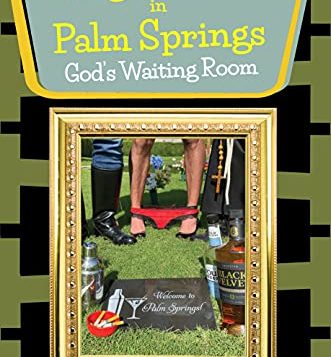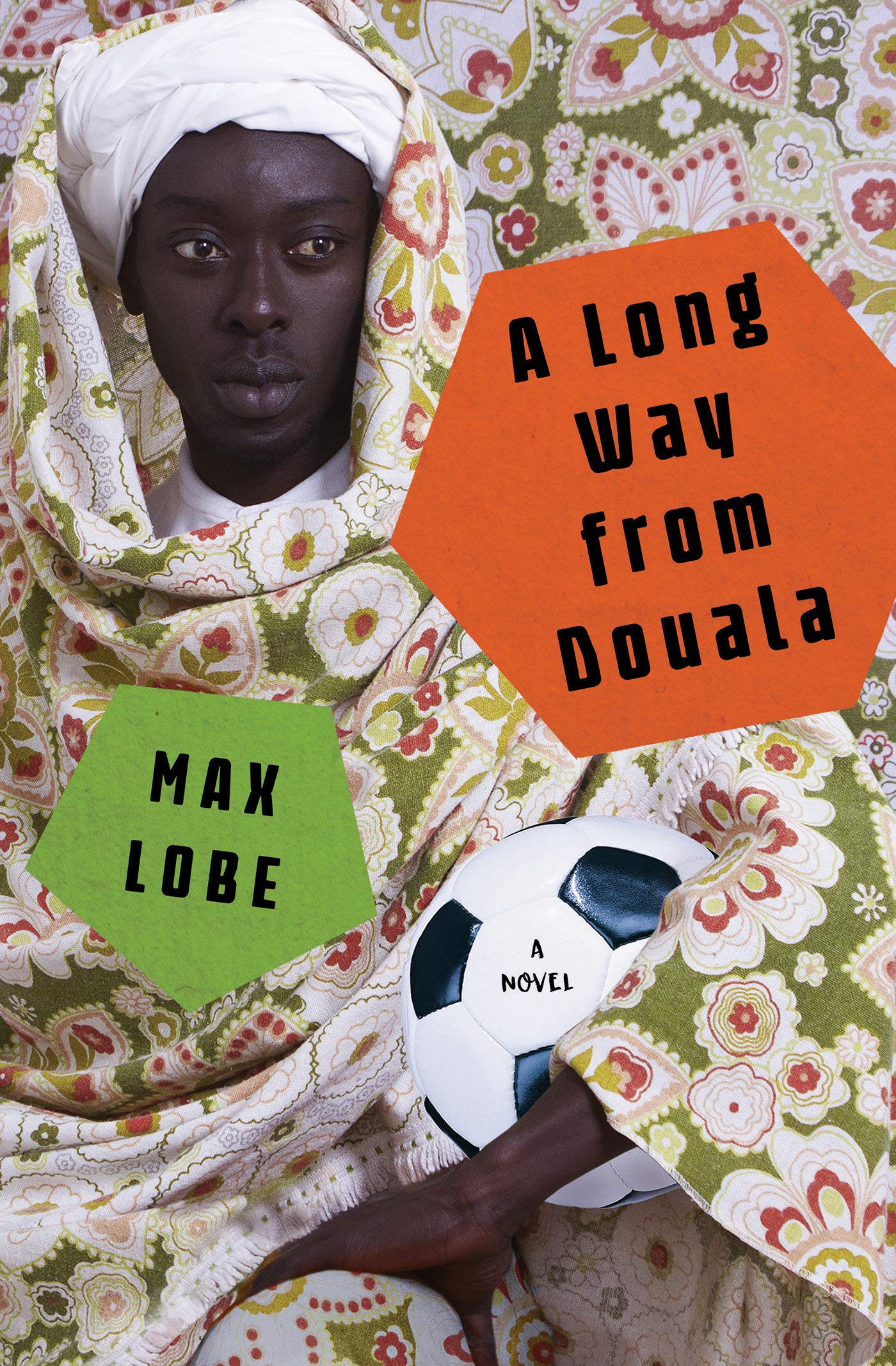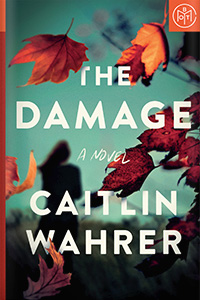 THE DAMAGE: A Novel
THE DAMAGE: A Novel
by Caitlin Wahrer
Pamela Dorman Books. 390 pages, $27.
NICK, a gay college student, and his housemates start a night out at Jimmy’s, a local dive bar in southern Maine. Buying shots for his friends, he is approached by a handsome stranger with a friendly come-on. After a few more drinks, Nick’s reserve loosens as he agrees to join the man in his motel room. Their chance meet-up turns into a nightmare. Early the next morning, Nick awakens alone in the room, his face brutally beaten with bloody sheets beneath him: he has been raped. Painfully dressing, Nick makes it home, where his mates quickly take him to the hospital’s ER. There, he begins an arduous healing process as the hospital staff, the police, the press, his family, and friends all become privy to his physical status. Above all, Nick struggles with his emotional state and that of those around him.
So the tale unfolds in The Damage by Caitlin Wahrer, her captivating debut novel, which weaves together the reactions of the main characters, all enmeshed in Nick’s experience. Managing the stinging effects of what they learn are Julia Hall, his sister-in-law, once a lawyer; Tony Hall, Nick’s older brother, who seethes with rage, and John Rice, an aging detective, who pieces together what actually happened. In short order, the perpetrator is identified and brought in for questioning. Admitting to what happened, the man says everything was consensual, including the rough stuff, which Nick enjoyed as much as he did. Who to believe? The media feast on the incident, broadcasting news and letters supporting each man. The long legal trail begins. Through brisk chapters relaying the characters’ reactions to Nick’s case, the novel challenges the reader to wonder how this tale will end.
Joe Ryan
IT PROBABLY SAYS a lot about the state of gay subject matter in the world today that, in a coming-of-age novel set in present-day Cameroon, the narrator Jean’s nascent sexuality is almost a minor point. Such is the case, however, in Max Lobe’s A Long Way from Douala. After his father dies, Jean’s brother, whose parents have never been supportive of his goals, sets out to cross illegally into Europe to become a professional soccer player. Along with his friend Simon, Jean sets off through the country in hopes of stopping his brother before he can cross the border. Meanwhile, Boko Haram is terrorizing the northern part of the country with constant raids, and Jean is beginning to feel an undeniable attraction to his fellow searcher Simon.
Less a story of emerging sexuality than a window into modern Cameroon, A Long Way from Douala shines a vivid light on a country struggling to define itself amid internal conflicts of tribalism, competing religions, and modernity. What brings it to life are the countless details, such as what’s for sale at the local roadside stands (“Condoms, bonbons, cigarettes!”), the pervasive corruption and ineffectuality of the government, and the casual abuse of children by their parents. There’s a sense that the children are all doomed if they don’t find a way out of there. Indeed,
lured by slogans promising “Azerbaijan! The key to success!” or “Odessa, the university for you,” many are tricked by scam artists who take their money and disappear. This is the world in which Jean is trying to define himself. In delineating this world, Max Lobe has written a very entertaining and illuminating novel.
Dale Boyer
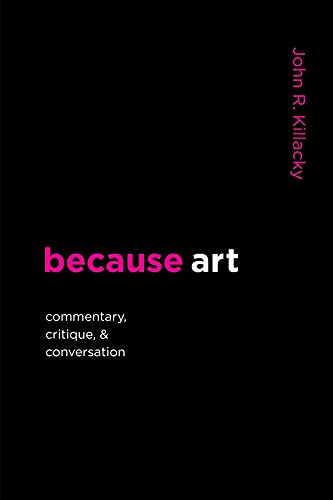 BECAUSE ART
BECAUSE ART
Commentary, Critique & Conversation
by John R. Killacky
Onion River Press. 252 pages, $20.
THIS IS a collection of 56 pieces, written for 39 publications, including this one, as well as several anthologies and catalogs, from 1993 to 2021. The pieces are generally short and direct, with changes in style according to the publication. Killacky began his career as a dancer, then became a dance company administrator, and evolved into being a presenter, producer, funder, and now a representative in the Vermont State House. His work as an arts administrator has given him a deep working knowledge of American cultural systems, while his experience with a long-term disability (particularly harsh for a former dancer) makes him acutely aware of the availability of these career paths. The first essay, “Called to Serve,” examines disability as a change agent. Killacky quotes John Cage as if to describe his own career: “I think my activity in the arts is analogous to political activity. It gives an instance of how to change things radically.” His essay on the theater company Steppenwolf offers an experience-based platform from which to impart his thoughts on how to diversify the arts. One strategy for the Chicago-based company was to have two artistic directors. This dynamic exchange between theory and practice is a strength of these pieces. Killacky exemplifies what seems to be a relatively new paradigm: the artist who is also an administrator and an activist.
Jeff McMahon
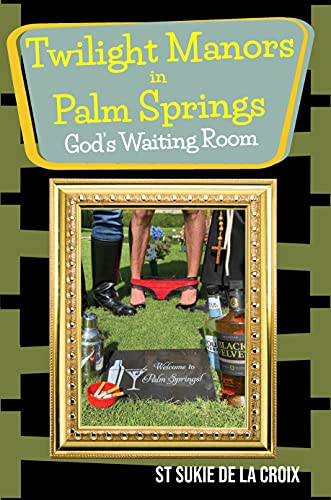 TWILIGHT MANORS IN PALM SPRINGS, GOD’S WAITING ROOM
TWILIGHT MANORS IN PALM SPRINGS, GOD’S WAITING ROOM
by St Sukie de la Croix
Rattling Good Yarns Press. 146 pages, $14.95
THE WRITER who styles himself “St Sukie de la Croix” has a long history of writing for the LGBT press and recording LGBT history. He immigrated to Chicago from England in 1991, then moved to southern California with his husband in 2014. His latest novel, Twilight Manors in Palm Springs, is an over-the-top comedy about a long-term gay male couple who have made the move to the vast retirement community that is Palm Springs, where the elderly characters all seem to be in denial about their proximity to death. The two newcomers, Brian and Stephane, exchange witty quips while taking part in physical comedy scenes reminiscent of Laurel and Hardy. When pudgy Brian tries to squeeze himself into a too-tight pair of jeans in a clothing store, the top button flies off and injures a salesman. When thin Stephane, a clueless cook, tries to make a chocolate mousse, the resulting explosion blows the door off the oven. Woven into the stream of pop culture namedropping and slapstick scenes involving earthquakes, rattlesnakes, orgies, and gun-toting homophobic rednecks is a murder mystery in which Brian and Stephane become reluctant amateur investigators. They save the day by exposing illicit heterosexual affairs among the Catholic clergy and a drug-running conspiracy in which contraband is imported from “Columbia.” Although their new community is anything but restful, Brian and Stephane become acclimatized. Like Stephane’s baking experiment, this novel contains a wide variety of explosive ingredients, handled lightly.
Jean Roberta
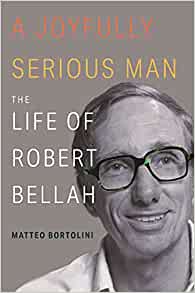 A JOYFULLY SERIOUS MAN
A JOYFULLY SERIOUS MAN
The Life of Robert Bellah
by Matteo Bortolini
Princeton University Press. 497 pages, $35.
ROBERT BELLAH (1927–2013) was his generation’s preeminent sociologist of religion. He gained wide attention after his seminal 1967 article coined the phrase “civil religion,” referring to a set of public beliefs—national symbols such as the flag or the presidential inaugural addresses with quasi-religious properties. Bortolini, sociology professor at the University of Padua, Italy, met and interviewed Bellah in 2007 while a visiting fellow at UC–Berkeley (where Bellah taught) and had access to Bellah’s private papers. He skillfully and compassionately balances the personal, academic, and cultural elements that comprised Bellah’s life, and presents his theories in understandable and accessible terms.
Bellah identified as bisexual, sustaining an open marriage with his wife Melanie, who encouraged him to explore his gayness. As a Harvard undergraduate, he briefly joined the Communist Party, and while working on his doctorate was advised to name fellow members, but he refused to comply. Bellah’s Habits of the Heart (1985) detailed how individualism and market ideology has undermined religion, political institutions, and relationships. The well- received book recast him as a prominent public intellectual. His magnum opus, Religion in Human Evolution (2011), a comparative study probing the axial religious traditions of India, China, the Greeks, and the ancient Israelites, was another attempt to bridge the humanities and the social sciences. Bortolini reveals how Bellah’s inner torment, desires, and losses (one daughter killed in an automobile accident, another a suicide) reflected his era’s religious and cultural struggles, which formed the backdrop for his work.
Brian Bromberger


